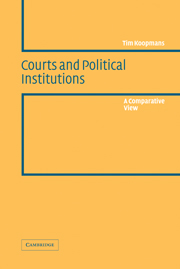Book contents
- Frontmatter
- Contents
- Preface
- Table of cases
- List of abbreviations
- 1 Introduction
- 2 The Sovereignty of Parliament
- 3 Judicial review of legislation
- 4 The growth of judicial power
- 5 The limits of judicial review
- 6 The legality of administrative action
- 7 Courts and governments
- 8 Courts and individual rights
- 9 Techniques of judicial protection
- 10 A glance at the future
- Select bibliography
- Index
4 - The growth of judicial power
Published online by Cambridge University Press: 26 February 2010
- Frontmatter
- Contents
- Preface
- Table of cases
- List of abbreviations
- 1 Introduction
- 2 The Sovereignty of Parliament
- 3 Judicial review of legislation
- 4 The growth of judicial power
- 5 The limits of judicial review
- 6 The legality of administrative action
- 7 Courts and governments
- 8 Courts and individual rights
- 9 Techniques of judicial protection
- 10 A glance at the future
- Select bibliography
- Index
Summary
Constitutional courts: Germany
At first sight, the main difference between the systems of judicial review of legislation in the United States and in Germany is that the latter country has specialized constitutional courts, exclusively competent to assess the compatibility of legislation with constitutional provisions. The Federal Constitutional Court (Bundesverfassungsgericht) performs this task with regard to compatibility with the federal constitution, the ‘Basic Law’. The difference from the American situation is not as great as it appears, however, since the certiorari system in the United States allowed the US Supreme Court to develop informally into a specialized court for constitutional matters. However, as the Bundesverfassungsgericht (or BVerfG, in the strange German abbreviation) is not an appeal court, special remedies have been created to provide access to it.
The Basic Law itself establishes seven of these remedies. Details are governed by federal statute; there is a Federal Constitutional Court Act or Bundesverfassungsgerichtsgesetz (BVerfGG). Two of these remedies are of particular importance for our subject. First, other courts faced with the argument that a federal or state statute is incompatible with the Basic Law will refer that problem to the Federal Constitutional Court, which will then decide the issue by way of a preliminary ruling. Secondly, anyone who alleges that one of his or her basic rights, as enumerated in the Basic Law, has been violated by any public authority can bring a ‘constitutional complaint’ before the Federal Constitutional Court.
- Type
- Chapter
- Information
- Courts and Political InstitutionsA Comparative View, pp. 63 - 97Publisher: Cambridge University PressPrint publication year: 2003



